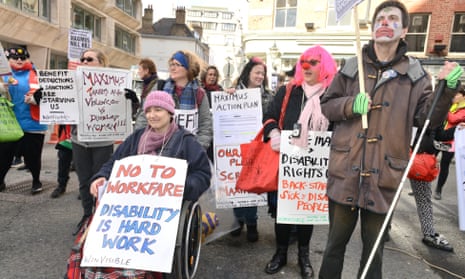Look closely enough and recent announcements reveal the two faces of Conservative disability policy. At the end of last month, Penny Mordaunt, the former disability minister and new international development secretary, announced the UK’s first global disability summit. To fanfare, Mordaunt positioned Britain as a global leader in disability rights, pledging to help other nations “tackle the barriers that prevent people with disabilities from fulfilling their potential.” Then the same night, buried at 10pm, the Department for Work and Pensions (DWP) released its long-promised plan to address this country’s ongoing disability unemployment crisis.
Since getting into power in 2010, disability unemployment has been a millstone around the Conservatives’ neck – they have repeatedly promised (and failed) to drive down unemployment figures while tightening eligibility and making cuts to the out-of-work sickness benefits, employment and support allowance (ESA), at the centre of their anti-welfare agenda. Now, more than a year on from its green paper and consultation last October, the new report revealed that the government has quietly dumped its pledge to halve the disability employment gap (fewer than five out of 10 disabled people have a job compared with eight in 10 non-disabled people), instead committing to get one million more disabled people into work by 2027, with a particular focus on people with mental health problems.
This target seems even more hollow in the light of chancellor Philip Hammond’s dire comments last week claiming disabled workers were partly to blame for the UK’s low productivity. But what the report ignores is as telling as what it actually says.
Despite previous promises to overhaul the hated work capability assessment (WCA), the new report contained only a vague pledge to “continuously improving the assessment process”. This is particularly damning in light of news that the current inquiry into disability benefits has been “deluged” by responses from disabled people in despair. There was also no reform of cruel conditionality used against disabled people struggling to be well enough to find a job, whereby benefit claimants have their benefits stopped for apparent infractions. It’s particularly worrying given that the rollout of universal credit – the benefit many people on ESA will soon be transferred to – seems to be continuing this pernicious sanctioning culture. Yet thousands of disabled people responded to the consultation to describe how sanctions damage their attempts to find work. As the charity Mind put it, the fact the report “doesn’t even make any mention” of this “is an insult to those who took the time to share difficult personal experiences in the belief that it would make a difference.”
The line in the report that says “If we could support just 1% more eligible employment and support allowance customers to find work in 2018-2019, this would bring an estimated saving to the exchequer of £240m” seemingly gives away the government’s real thinking: disabled people are not individuals to help but a drain on the taxpayer.
Tackling Britain’s disability unemployment problem will always be a long-term project. It will take multiple measures: from changing employers’ attitudes to hiring disabled staff– and increasing workplace adaptations (including flexible hours) to making public transport more accessible. It will also mean developing a humane and accurate assessment process and sufficient social security for disabled people who, no matter how much support they get, can’t work.
But the Conservatives will never get a hold on the issue of disability unemployment while they stick with failing austerity ideology. No amount of buzzwords, advisers, or links with business will help disabled people work if you’re removing the cars they need to get to the office or the social care packages that enable them to get dressed in the morning. Neither will cutting the Access to Work that, say, pays for a deaf employee’s BSL interpreter. Nor will you be able to help them whilst you’re sanctioning their benefits or creating jobcentres with a culture of fear.
Just like Theresa May’s “just-managing families” and her desire to end the “burning injustice” of mental health inequality, a bid to help disabled people into work would mean more if the Tories weren’t creating policies that were actively hurting them. If the Conservative party wants to be a global leader in disability rights, it should look closer to home.

